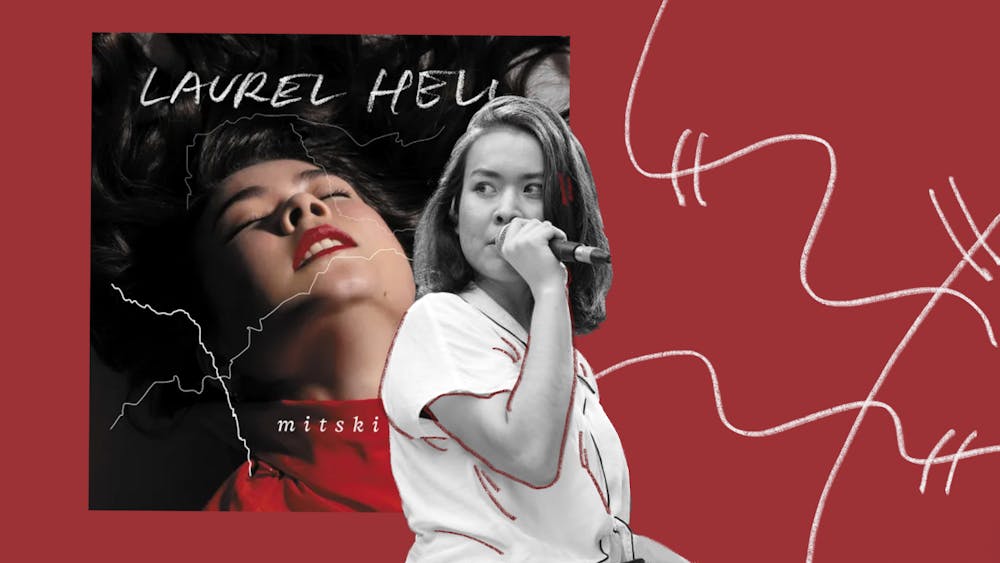Honesty is the best policy, as the old adage goes. For Mitski Miyawaki, honesty is the only policy.
Mitski has always been known for her brutal frankness, from diary–like song lyrics that rival Taylor Swift’s to proclaiming that fans “should not meet [her] because they would be disappointed.” Yet, the bluntness in her candor manages to create an aura of allure and sincerity surrounding the indie star.
When fans heard that she was quitting music in 2019, they panicked, fearing that it would be the last time they would experience the musician's unique approach to her craft. Mitski later clarified that she was only going on indefinite hiatus, but hence began a long drought of Mitski music, save a few soundtrack songs and one–off projects.
Finally, we’re at the end of the “indefinitely” phase. This month, Mitski gifted us Laurel Hell, a short 11–track project that shows the singer–songwriter as her most honest self. Throughout the album, she explores how her career affected her personal life while continuing to expand her motif of detailing unhealthy relationships.
The name Laurel Hell is very indicative of the mood of the album. While laurels are historically worn as an honor, Mitski implies that such honors are a sort of hell, a standard that she feels like she has to reach. As an artist constantly stuck in between fame and obscurity, Mitski knew her comeback to music meant that all eyes were on her. Thus, on the opening track “Valentine, Texas,” she reminds herself to “step carefully into the dark” when going back into music but optimistically concludes that she’ll “remember [her] way around.”
Just this short opening track already reveals so much about Mitski, and the rest of the album follows suit. A more pessimistic view of her career arises from the track “Everyone,” where the singer notes that she sometimes feel free “until [she] finds [she's] back in line again.” These lyrics, backed by a jarring synth line that's constantly repeating in the background, convey a monotonous, claustrophobic feeling. Mitski has always prided herself as an independent artist and frequently critiques the music industry for being too capitalist. Yet, she admits she’s a part of that industry as well. In Mitski's ideal world, Be the Cowboy should’ve been her planned exit where she would be “free.” In fact, she has said in interviews that she initially grumbled about making this record, which was contractually obligated by her label.
Continuing the self–evaluation of her career, Mitski explicitly details her struggles with continuing music on the lead single “Working For The Knife,” feeling that “the road ahead appears the same.” The singer–songwriter has publicly stated that quitting music helped her regain her love for creating music, and indeed, the lyric that follows (“Maybe at thirty, I'll see a way to change / That I'm living for the knife”) showcases an artist’s newfound appreciation for their art.
That said, it wouldn’t be a Mitski album without a deep dive into relationship dynamics. On "Stay Soft" she announces that she's a “sex god," but under all the bravado reveals a vulnerability present in the lyrics that disappears behind the upbeat, rock–forward production. “You stay soft, get beaten / Only natural to harden up” goes the chorus, implying that sex was used as a mechanism to hide the pain. This deliberate juxtaposition is very on–brand for the singer, who intentionally created the song so people “don’t feel alone” in this unhealthy action.
“Love Me More,” also deals with themes of isolation and love. “Love me more / Love enough to fill me up,” begs Mitski in the chorus, wanting a lover to fill the void of her emotions. On “I Guess,” she admits that she “[doesn’t] yet know quite how to live” without her former lover. Mitski excels at these deeply personal moments, often foregoing conventional song structure in favor of portraying a more candid and truthful atmosphere. Nearly half of the songs don’t even contain a strictly–defined chorus. That, combined with the mostly upbeat, pop–rock production, creates an atmosphere one could describe as dance–crying.
In an interesting development, Laurel Hell marks the first time Mitski co–wrote a song, breaking a streak of completely self–written albums. “The Only Heartbreaker” was co–written by Dan Wilson, who previously collaborated with the likes of Adele and Swift—artists known for their own heart–wrenching, personal lyrics. That may be the reason why Wilson’s contribution is indistinguishable from Miyakawi's, as the pair doesn’t deviate from Mitski’s usual style of honest, no–filter lyricism. “So I'll be the loser in this game / I'll be the bad guy in the play” she sings, revealing her feelings of self–doubt and self–deprecation.
Overall, the album feels like a standard Mitski album, but don’t be deceived by her usual candor. Laurel Hell is rooted in Mitski’s realization of her love for music, somehow creating a more personal album than her previous works. It comes from a deeply independent artist who tried to shy away from the music industry and didn’t even want to create this album. Mitski has been able to tap into her creative reserves at least one more time, yielding her highest–peaking album to date on the Billboard 200.
It's obvious that the demand for Mitski isn’t going away, and as long as she doesn’t either, Mitski will continue to hold her grasp in the indie and alternative music scene.







